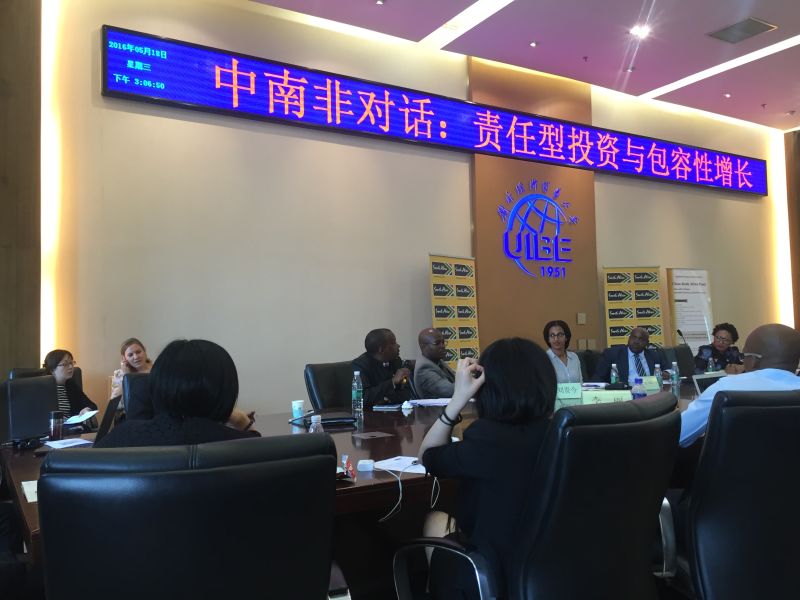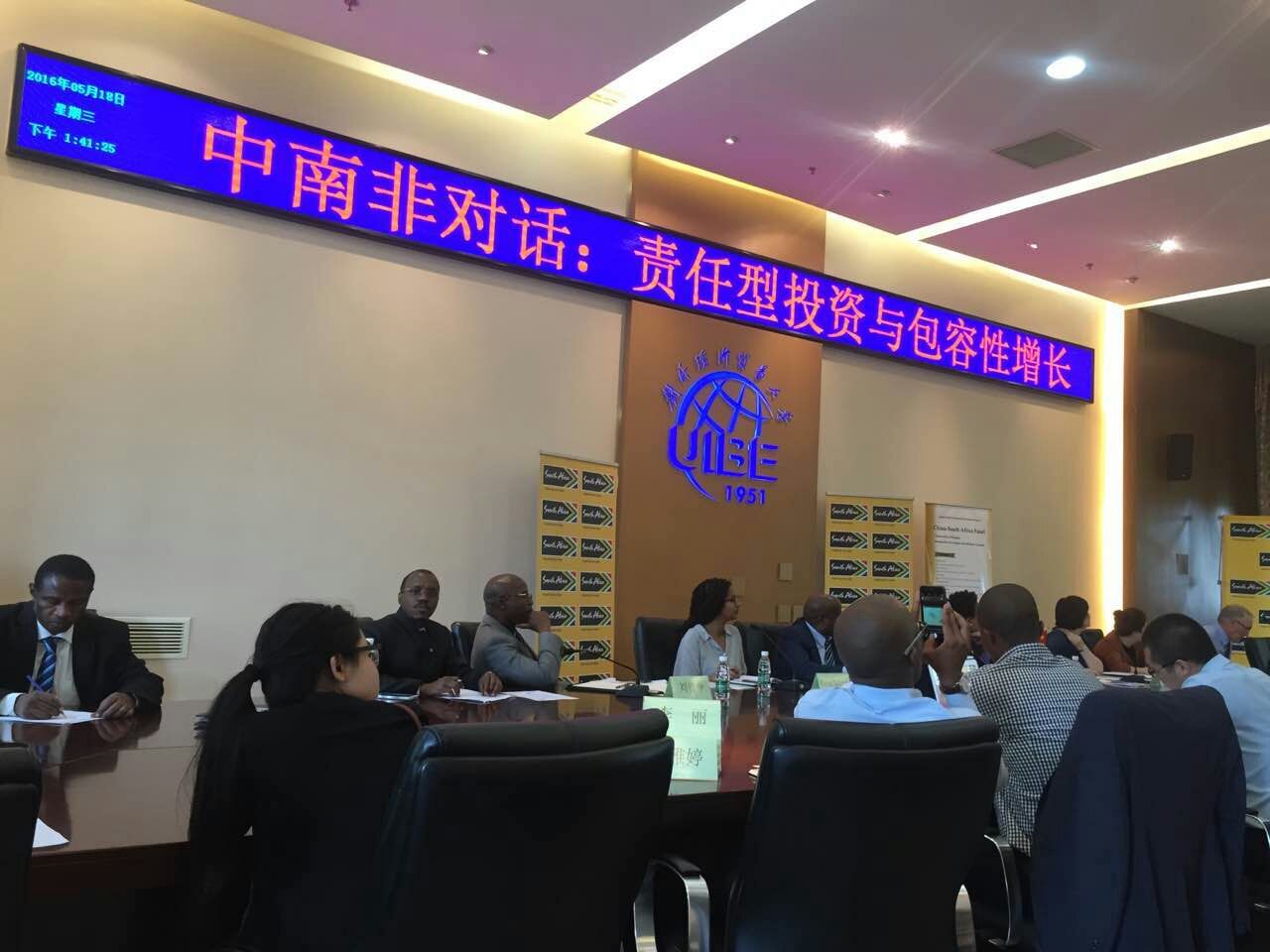China and Africa have been a community of shared interests, shared destiny and have been one of the most important partnership in the 21st Century. As Chinese investment to the Continent is geometrically expanding, it is but imperative that Chinese enterprises needs to adopt a more strategic model engulfing responsible investment and inclusive growth remedying dissimilar environmental diversity in ensuring and contributing to the social & ecological needs that warrant the full implementation of Corporate Social Responsibility, economic prosperity and sustainable growth in meeting the needs of the African market.

Photo taken during the Salon Conference organised by The Center for International Business Ethics(CIBE) in collaboration with The University of International Business and Economics(UIBE) at Beijing PR. China
In recent times, Responsible investments constitute companies adopting investment models that will gear towards value addition to the economy tending to mimic the political and social climate of the time in seeking out social justice, environmental sustainability and alternative energy/clean technology efforts to name but a few which can be made by individual companies or through a socially conscious mutual fund or exchange-traded fund(ETF) deviating from the mediocrity of investment models that have a retrogressing effect on the economy as in the case of Companies engaging in the production or selling of addictive substances (like alcohol, gambling and tobacco), coal mining industries. Awareness has grown in recent years over global warming and climate change, socially responsible investing has trended toward companies that positively impacting the environment by reducing emissions or investing in sustainable or clean energy sources .Mutual funds and ETFs provide an added advantage in that investors can gain exposure to multiple companies across many sectors with a single investment. Investors should read carefully through fund prospectuses to determine the exact philosophies being employed by fund managers.
Rapid and sustained poverty reduction requires inclusive growth which is a concept that advances equitable opportunities that allows people to contribute to and benefit from economic growth indicating a direct link between the macroeconomic and microeconomics determinants of the economy and economic growth. The micro dimension captures the importance of structural transformation for economic diversification and competition, including creative destruction of jobs and firms that impede human livelihood. The concept of inclusive growth encompasses equity, equality of opportunity, and protection in market and employment transitions as a fundamental essential ingredient of any successful growth strategy. Though inclusive growth relatively have different meaning based on the concept adopted by various countries in the world, for the African Continent especially the Sub-Sahara region are in dying needs of inclusive growth constituting; An expansion in employment and labour intensity, increased public sector employment or employment schemes, better social outcomes (health, education, etc.) due to improved public services to the poor, increased social protection and social welfare, and the increased integration of the second economy.
It is worthy to note that the absence of a link between economic growth and inclusiveness is evidence that normal growth alone cannot reduce poverty and inequality and increase employment. In addition to the absence of trickle-down effects to reduce poverty, it probably means that current economic growth is not accompanied by the generation of adequate employment.

If economic policy could develop untapped economic and employment potential in the informal sector, together with efforts to stimulate the demand for unskilled and semi-skilled labour in the formal sector, such inclusivity could produce an economic growth trajectory that would increase the scope and value of economic activity and incomes also in the informal economy. Income-generating activities in the informal sector would become an integral part of growing economic activity. Poor and marginalized people would contribute to growth rather than just receiving benefits from formal sector growth in the form of social spending or grants.
Pursuing and attaining such inclusive growth would clearly require much more than ‘priming the pump’ and/or increasing social spending. It would require an explicit inclusive policy strategy to increase productive activity, employment, self-employment and earnings in both informal and formal segments of the economy, to develop durable backward and forward linkages between these segments and facilitate sustainable transitions into employment.

In general, social responsibility is more effective when a company takes it on voluntarily, as opposed to it being required by the government or some higher source. Social responsibility tends to boost company morale, but this is especially true when a company and its employees are actively engaged in the social cause they're taking on.
That said, not everybody believes that business should have a social conscience. Noted economist Milton Friedman noted that the "social responsibilities of business are notable for their analytical looseness and lack of rigor." Friedman believed that only people could have social responsibilities. Businesses, by their very nature, cannot. In fact, many experts believe that social responsibility is in direct opposition to the basic point of a business and the economics that govern it.
Recommendations:
Ø A pragmatic CSR forum needs to be establish that intermediate between foreign investors and the community people/citizen with a grip of an open model for a more flexible and effective dialogue purposely to promote outreaching and sustainability of the CSR model and practices, expanding on the effect of CSR related policies and legislation with a clarified and integrated CSR strategy in Africa that’s different from generosity.
Ø Increase investment portfolio to Africa, information availability and enable demand identification and devoid from concentrating in just the East and South of Africa but opening up to other African blocs like the West (ECOWAS).
Ø Support risk mitigation and financing
Ø Companies should invest in Industrialization and good business models as they’re the most needed now in the African continent to create job, grow the economy, alleviate poverty and improve infrastructure etc.
Ø Chinese Companies most actively practice CSR strategies and make it a core model in their operation
Ø African governments should create more collaboration between public and private sectors on the topic of CSR for the effective implementation of the Chinese PPP model.
Ø The Companies should embark on self sustainable external projects that do not rely on third-party funding like HIV/AIDS, skills development, agriculture and environment (especially water)
Ø Companies should avoid going for the ‘easy way’ to make direct third-party investments, but always aim to improve the surrounding economies and communities for more trust and expansion of the local market
Ø Companies most keep the different pillars on economic welfare and wellbeing like in the case of the Broad-Based Black Economic Empowerment(BBBEE) scorecard in south Africa adhering to the mandatory King-III codes compliance policy on corporate governance
Ø To enforce and enhance sustainability, companies should spend the obligatory CSR-investments in SED-projects, the workforce and working conditions or improve the formal business processes such as transparent reporting, CSR down the supply chain or prevention of corruption.
Ø Provide deal facilitation and business support- good business models that create job, grow the economy and improve the standard of living and better human livelihood
Ø Expand on infrastructural Investment and intellectual and knowledge base model in Africa
Ø Skills training for various sectors to meaningful contribute in nation building to be inclusive in the growth model
Ø African Government most creates the enabling investment environment with clear rules of the game.
Ø Companies most comply to both the primary and secondary criteria to mitigate the risk of default
Ø Companies should pay special attention to the welfare of the employees and getting involved in collaborative sustainable initiatives
Ø Companies should set a good example by sharing CSR knowledge, expertise and best practices with African players
Ø Companies should help minimize the gap of inequality in communities with an effort of creating a sustainable economy
Ø Lastly, China should prioritize the development challenges of Africa within the established FOCAC framework, including addressing issues such as food insecurity, climate change and adaptation technology and infrastructure.






Comment